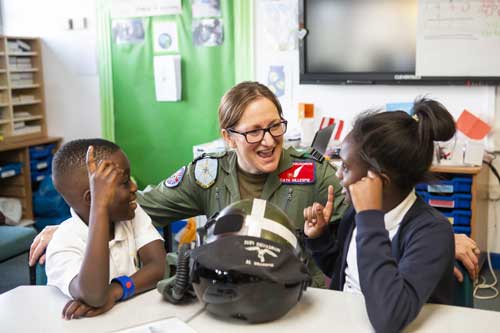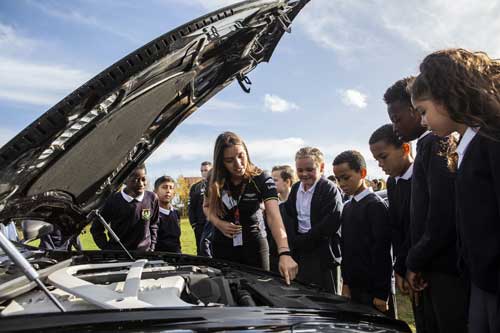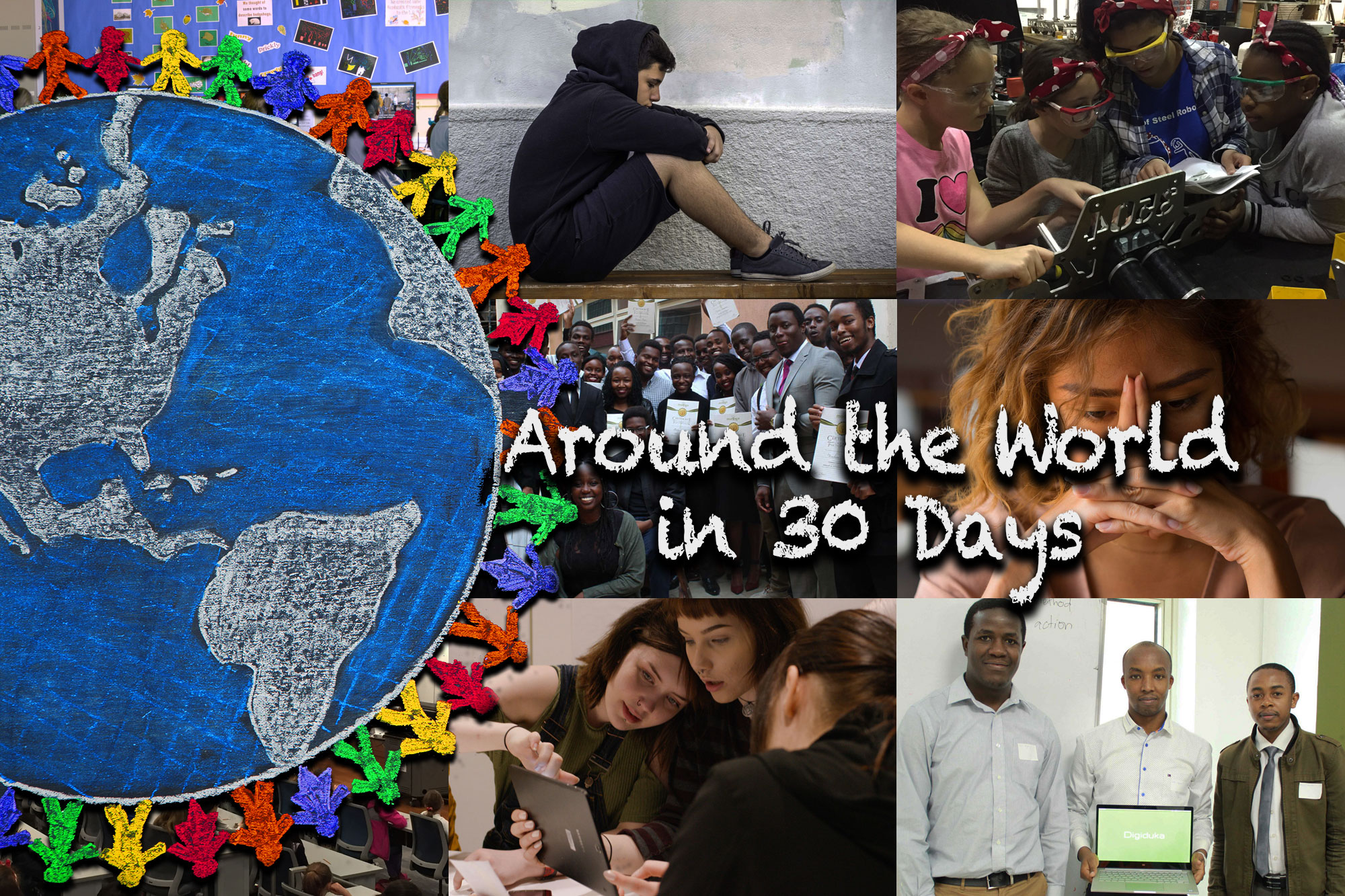Understanding the reality of the working world becomes clearer the more times a young person interacts with the world of work.” – Nick Chambers
The future will be about pairing the cognitive, social and emotional capabilities of human beings with machines. The ‘Drawing the Future’ relazione (a collaboration between the OECD and the UK based charity, Istruzione e datori di lavoro) was published in Davos this year. It featured 20,000 children aged 7 - 11 da 20 countries sharing their opinions about what they want to be when they grow up. According to Nick Chambers, Chief Executive of Education and Employers, the kids’ perspectives were often based on gender stereotypes, socio-economic backgrounds, and TV and social media. He notes that “36% based their career aspirations on someone they knew, 45% because of TV, film or radio, solo con 1% learning about a job from someone visiting their school.” Gender and socio-economic stereotyping had a lot of impact with 20 times as many boys planning “to have a role in the armed forces or firefighting services” as compared with girls who “aspired to be involved in the fashion industry.”
Futures primari, developed by the National Association of Head Teachers and Education and Employers, get volunteers from the world of work to go into primary schools and answer questions from children about jobs and career paths. Il Global Ricerca per l'Educazione is pleased to welcome Nick Chambers to talk about his organization that is inspiring children to look at their future without gender bias by introducing them to employee volunteers during their primary school years.
“We have worked with schools, employers and the government to create the state-of-the-art match making service.” – Nick Chambers
tacca, in what ways have you revolutionized the way young people interact with the employment network? What are the strategies you are personally proud of?
We have worked with schools, employers and the government to create the state-of-the-art match making service. Inspiring the Future connects volunteers from the world of work with schools – it is used by Primary Futures. It makes it very easy for employers to connect with schools and vice versa – for free. The growth of this network, which now stands at more than 50,000 volunteers, 80% of all secondary schools and 4,000 scuole elementari, demonstrates just how much this service is valued and something of which I am proud.
What can other organizations around the world learn from your work in nurturing social capital at an early age?
At Education and Employers, our work in connecting young people with the world of work is underpinned by robust and renowned research. We have made a compelling case that the quality and quantity of employer engagement experienced by young people while in school and college make it easier for them to navigate the increasingly difficult move from school to sustained, successful employment. It helps them to compete more effectively, make more informed decisions and makes a significant difference to how well they do in the world of work in early adulthood.
Nostro ricerca found that respondents who recalled experiencing four or more career talks with employee volunteers between the ages of 14–16 were 25% less likely to be in Not in Education and Training (NEET) than their peers who did not take part in the activity.
The early years of a child’s life are a key time in the formation of their attitudes and expectations. Our research has shown that children start to rule career options in or out at an early age and girls and boys hold stereotypical views about male and female careers by age seven. One way of tackling this is to make sure they meet professionals of both genders who work in a variety of roles and sectors. Primary Futures has developed activities that work particularly well for primary school children to inspire them, broaden their horizons, sfidare gli stereotipi in aspirazioni di carriera e rendere il legame tra ciò che imparano a scuola e lavoro.
“V'è una crescente necessità per i giovani di tenere una più ampia serie di caratteristiche quando entrano nel mercato del lavoro.” – Nick Chambers
Uno dei vostri risultati chiave è che “quei giovani che hanno più da guadagnare dall'impegno datore di lavoro attualmente hanno meno accesso ad esso”. Come stai colmare il divario? Come è la tecnologia porzione?
While organizations to assist linkages between secondary schools and businesses have existed for over 30 anni, much of the work to bring employers into both primary and secondary schools has been done using informal local or personal connections. Using the Primary Futures online platform designed for teachers to broker these connections can help formalize arrangements, ensuring that schools can facilitate meaningful interactions at a fraction of the costs involved in traditional brokerage.
Inspiring Futures future ed primarie si basano sulla semplice premessa che, se chiesto, molte persone - da tutti i ceti sociali - sarebbero disposti ad aiutare i giovani e le scuole. La tecnologia ci permette di fare questo su scala.
Lavorando a stretto contatto con le principali organizzazioni sindacali di insegnamento, principali datori di lavoro e le relative organizzazioni professionali, così come i dipartimenti governativi, siamo in grado di identificare le aree chiave di bisogno. In quel modo, chi si incontra non ha bisogno di essere su chi sei o le vostre famiglie sai.
For the first time ever WEF Delegates attended a Davos primary school and spoke to children about their jobs and career paths. What did the children learn from this experience?
I think the best way to answer this is to share our video clip from the Davos school.
“Employers are increasingly looking for people who can engage and respond to less predictable work situation.” – Nick Chambers
How can school education of today better prepare students for jobs that only exist in the future?
There is a growing need for young people to hold a broader set of characteristics when entering the labor market. Employers are increasingly looking for people who can engage and respond to less predictable work situations. And recent work by the World Economic Forum has also argued that technological trends in the UK labor market mean that the value of interpersonal skills is likely to grow exponentially as automation further takes hold.
Our recent report Joint Dialogue has shown that teachers believe that there is simply less time to use pedagogies that promote skills development. Rote learning and knowledge recall are necessary to ensure that young people get the qualifications they need to progress. Given the fact that workplaces and society are becoming more technologically advanced and digitalised, it is worrying that there is less impetus on these skills and many schools are finding less time to teach them. The Fourth Industrial Revolution and the increase in automation will require workers to have a higher level of digital skills than has previously been required. It is cause for concern that we are not adequately preparing young people for this rapidly changing world.
We need to ensure that the skills, for example reflection, creative skills and communication skills that make us human are nurtured and developed sufficiently. Understanding the reality of the working world becomes clearer the more times a young person interacts with the world of work. These encounters also help students understand the skills that will be needed in the work force even if future jobs are less well understood.
What’s the next big question about education and employer engagement you plan to investigate? What kinds of feedback are you looking for from the children in your next study?
We are looking in more detail at how these encounters can have an impact on attainment, attendance and behavior. These are key drivers for school leaders and if we can show a positive impact on those aspects of pupils’ school careers, then we can achieve even more engagement from schools.
Per ulteriori informazioni: Ricerca.
C. M. Rubin and Nick Chambers
Grazie a voi 800 più collaboratori a livello mondiale, insegnanti, imprenditori, ricercatori, dirigenti d'azienda, studenti e leader di pensiero da ogni dominio a condividere le prospettive sul futuro della formazione con Il Global Ricerca per l'Educazione ogni mese.
C. M. Rubin (Cathy) è il fondatore di CMRubinWorld, una casa editrice on-line focalizzata sul futuro dell'apprendimento globale e il co-fondatore di Planet aula. Lei è l'autore di tre libri best-seller e due molto letto serie on-line. Rubin ha ricevuto 3 Upton Sinclair Awards per “The Global Search per l'educazione”. La serie che sostiene per tutti gli studenti è stato lanciato nel 2010 e riunisce i leader di pensiero illustri provenienti da tutto il mondo per esplorare le questioni legate all'istruzione fondamentali affrontate dalle nazioni.
Segui C. M. Rubin su Twitter: www.twitter.com/@cmrubinworld










Commenti recenti